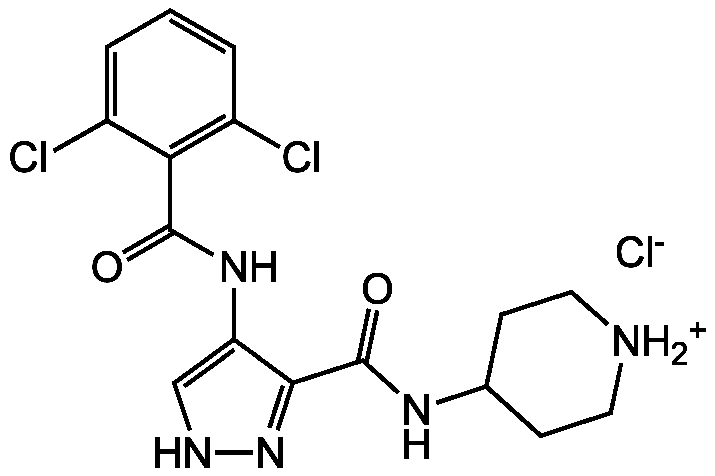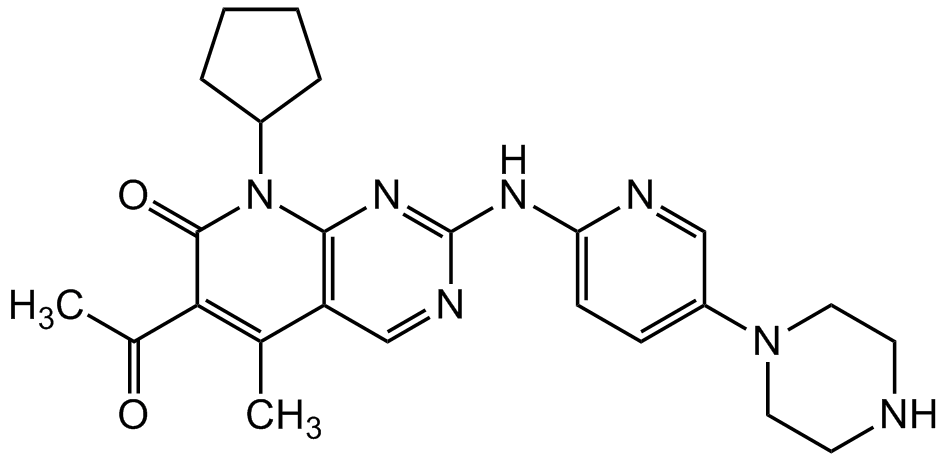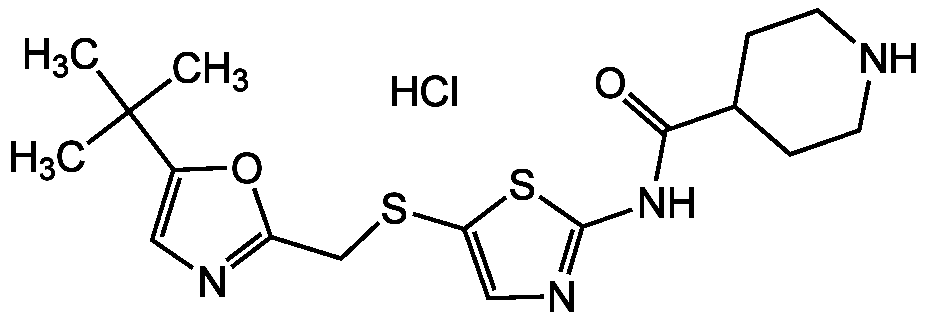
Chemical Structure
AT7519 hydrochloride [902135-91-5] [902135-91-5]
SYN-1010
CAS Number902135-91-5
Product group Chemicals
Estimated Purity>95%
Molecular Weight382.2 . 36.5
Overview
- SupplierSYNkinase
- Product NameAT7519 hydrochloride [902135-91-5] [902135-91-5]
- Delivery Days Customer2
- CAS Number902135-91-5
- CertificationResearch Use Only
- Estimated Purity>95%
- Molecular FormulaC16H17Cl2N5O2 . HCl
- Molecular Weight382.2 . 36.5
- Scientific DescriptionAT7519 is a potent inhibitor of several CDK family members. AT7519 showed potent antiproliferative activity (40-940nM) in a panel of human tumor cell lines, and the mechanism of action was shown here to be consistent with the inhibition of CDK1 and CDK2 in solid tumor cell lines. AT7519 caused cell cycle arrest followed by apoptosis in human tumor cells and inhibited tumor growth in human tumor xenograft models. Tumor regression was observed following twice daily dosing of AT7519 in the HCT116 and HT29 colon cancer xenograft models. Also it has been shown that the biological effects are linked to inhibition of CDKs in vivo and that AT7519 induces tumor cell apoptosis in these xenograft models. Moreover, AT7519 has an attractive biological profile and is well tolerated and effective making it a more plausible candidate for clinical development than previously available CDK inhibitors. In in vitro kinase assays AT7519 showed nanomolar levels of activity from < 10 to 2400 for cyclins; only one other non-cyclin related kinase was inhibited at levels below 10microM (GSK3beta, 89nM), all others tested had IC(50)s of greater than 10,000nM. - Chemical. CAS: 902135-91-5. Formula: C16H17Cl2N5O2 . HCl. MW: 382.2 . 36.5. AT7519 is a potent inhibitor of several CDK family members. AT7519 showed potent antiproliferative activity (40-940nM) in a panel of human tumor cell lines, and the mechanism of action was shown here to be consistent with the inhibition of CDK1 and CDK2 in solid tumor cell lines. AT7519 caused cell cycle arrest followed by apoptosis in human tumor cells and inhibited tumor growth in human tumor xenograft models. Tumor regression was observed following twice daily dosing of AT7519 in the HCT116 and HT29 colon cancer xenograft models. Also it has been shown that the biological effects are linked to inhibition of CDKs in vivo and that AT7519 induces tumor cell apoptosis in these xenograft models. Moreover, AT7519 has an attractive biological profile and is well tolerated and effective making it a more plausible candidate for clinical development than previously available CDK inhibitors. In in vitro kinase assays AT7519 showed nanomolar levels of activity from <10 to 2400 for cyclins; only one other non-cyclin related kinase was inhibited at levels below 10microM (GSK3beta, 89nM), all others tested had IC(50)s of greater than 10,000nM.
- Storage Instruction2°C to 8°C
- UNSPSC12161509



![AT7519 Hydrochloride [902135-91-5]](https://www.targetmol.com/group3/M00/35/42/CgoaEWayGnGESk7gAAAAALFnV70780.png)
